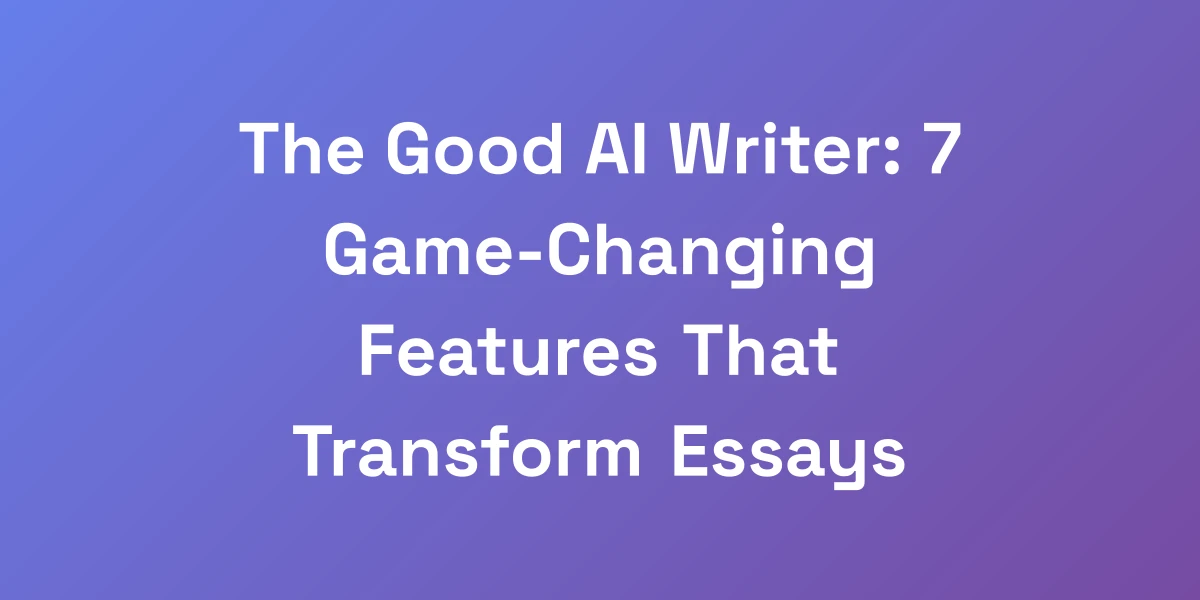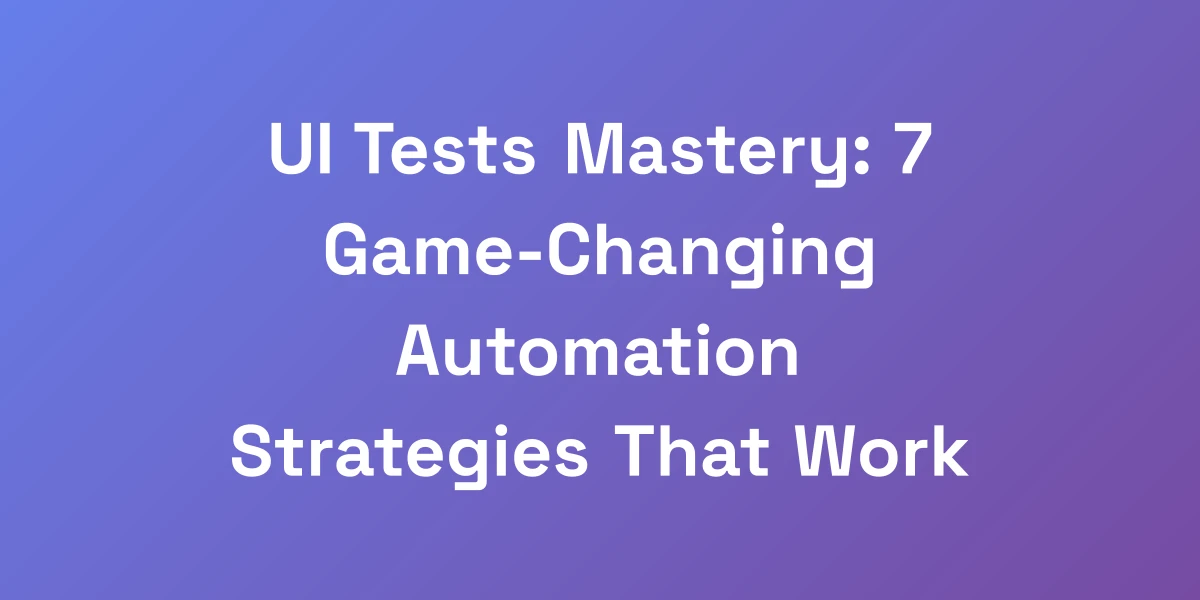
The Good AI Writer: 7 Game-Changing Features That Transform Essays
Apr 6, 2025 | By zishansami102@gmail.com
We’re standing at the crossroads of a revolution in academic writing. The Good AI Writer isn’t just another tool in the arsenal—it’s reshaping the very foundation of how we approach essay writing. Imagine this: while some are stuck in the grind of traditional essay crafting, grappling with writer’s block and endless revisions, smart students are harnessing AI to produce compelling, well-structured essays in a fraction of the time.
This isn’t about cutting corners; it’s about leveraging cutting-edge technology to elevate our writing game. The challenges we face in academic writing—time constraints, the pressure for originality, the demand for impeccable structure—are being met head-on by AI’s transformative capabilities. Ready to discover how The Good AI Writer can revolutionize your essay writing process? Let’s dive in.
Why Traditional Essay Writing is Dead (And That’s a Good Thing)
Let us hit you with some truth: if you’re still writing essays the old-school way, you’re leaving money and time on the table. The Good AI Writer isn’t just another tool—it’s a complete paradigm shift in how we approach academic writing. Think about it: while your competitors are burning the midnight oil struggling with writer’s block, smart players are leveraging AI to produce better essays in 1/10th of the time. But here’s the kicker: it’s not about being lazy; it’s about being strategic with your resources.
The Rising Demand for AI Writing Assistance
The adoption of AI writing tools in academia has skyrocketed. By late 2023, usage among academic writers surged from 29% to 41% for writing research manuscripts, and from 32% to 43% for editing within just six months. These numbers aren’t just statistics—they represent a widespread recognition of AI’s value in enhancing the writing process. For more insights on the impact of AI on writing, check out what the future holds for AI in academic writing.
- Efficiency: Students are achieving more in less time.
- Quality: Enhanced structure and clarity lead to higher grades.
- Accessibility: AI tools level the playing field for non-native speakers.
With over half (53%) of undergraduates using AI for assignments that count towards their grades, it’s evident that AI is becoming an indispensable asset in academic settings.
How AI is Revolutionizing Academic Writing
AI isn’t just automating tasks; it’s transforming the very essence of essay writing. Tools like The Good AI Writer employ deep learning algorithms that understand context, ensuring that the generated content is not only coherent but also relevant and insightful. For an overview of the best AI writing tools available, take a look at the best AI writing tools.
- Contextual Understanding: AI comprehends the subject matter, producing essays that are both accurate and engaging.
- Customization: Tailor the writing style to match specific academic disciplines or personal preferences.
- Real-Time Feedback: Instant suggestions for improvement enhance the learning process.
This revolution means students can focus more on their ideas and less on the mechanics of writing, fostering a deeper engagement with their subjects.
The Cost of Ignoring AI Writing Tools
Choosing to ignore AI tools like The Good AI Writer isn’t just a missed opportunity—it’s a disadvantage. In a landscape where efficiency and quality are paramount, relying solely on traditional methods can hinder academic progress and competitiveness.
- Time Loss: Traditional writing methods are time-consuming, leaving less room for other critical tasks.
- Reduced Quality: Manual writing often lacks the polish and precision that AI can provide.
- Competitive Edge: Students utilizing AI have a distinct advantage in producing superior essays.
With AI tools proving to reduce writing time by up to 90%, the cost of not integrating these technologies is substantial.
Breaking Down the Success Metrics
Success in academic writing isn’t just about word count or meeting deadlines. It’s about producing work that’s insightful, well-structured, and free of errors. The Good AI Writer excels in these areas through:
- Accuracy: Ensuring factual correctness and reliable sources.
- Clarity: Promoting clear and concise expression of ideas.
- Originality: Generating unique content that stands out.
These metrics are not abstract concepts—they translate to higher grades, better comprehension, and a more profound understanding of the subject matter.
Real Stories of Academic Transformation
Consider Sarah, a college junior who struggled with structuring her essays. After integrating The Good AI Writer into her workflow, she saw her grades improve by two notches within a semester. Another example is James, who used AI to overcome writer’s block, enabling him to complete his research paper ahead of schedule while maintaining high standards of quality. To learn more about overcoming writer’s block with AI assistance, check out how AI can help overcome writer’s block.
- Sarah’s Story: From struggling drafts to top-tier essays.
- James’s Journey: Overcoming writer’s block with AI assistance.
These real-life transformations underscore the profound impact AI can have on academic success.
Core Features That Make The Good AI Writer Stand Out
Listen up, because this is where most people get it wrong. The magic isn’t in having AI write your essays—it’s in how you use the technology to amplify your natural abilities. The Good AI Writer has cracked the code with features that actually matter. We’re talking about deep learning algorithms that understand context, not just string words together. The platform doesn’t just write; it thinks, adapts, and evolves with your needs. Here’s what separates the winners from the wannabes in the AI writing game.
Advanced Natural Language Processing
At the heart of The Good AI Writer lies its advanced natural language processing (NLP) capabilities. This technology allows the AI to understand and generate human-like text, ensuring that your essays are not only grammatically correct but also rich in context and nuance.
- Contextual Awareness: The AI discerns the context of your topic, producing relevant and precise content.
- Nuanced Language: It captures the subtleties of language, making your essays more engaging and sophisticated.
- Error Reduction: Minimizes grammatical and syntactical errors, enhancing overall quality.
This level of sophistication ensures that the AI-generated content aligns seamlessly with academic standards.
Customizable Writing Styles
No two essays are alike, and neither are student preferences. The Good AI Writer offers customizable writing styles, allowing you to tailor the tone and structure to fit specific requirements or personal preferences.
- Disciplinary Adaptation: Adjust the writing style to suit different academic fields, whether it’s humanities, sciences, or social studies.
- Personal Voice: Maintain your unique voice while benefiting from AI enhancements.
- Flexibility: Easily switch between formal, analytical, or creative styles as needed.
With this feature, your essays remain authentic, reflecting your personal insights and academic integrity.
Intelligent Research Integration
Research is the backbone of any compelling essay. The Good AI Writer integrates intelligent research capabilities, streamlining the process of gathering and synthesizing information. For detailed research assistance, visit EduWriter for research integration.
- Automated Research: The AI can search and compile relevant sources, saving you hours of manual research.
- Smart Summarization: Condenses long articles and papers into concise summaries for easy reference.
- Source Credibility: Ensures that the sources used are reputable and relevant to your topic.
This integration not only accelerates the research process but also enhances the depth and credibility of your essays.
Plagiarism Prevention Technology
Academic integrity is non-negotiable. The Good AI Writer features robust plagiarism prevention technology to ensure your work remains original and free from unintentional duplication. For understanding the policies surrounding academic integrity and AI, refer to academic integrity in the age of AI.
- Original Content Generation: The AI creates unique content tailored to your prompts.
- Duplicate Detection: Scans your essay for potential overlaps with existing content.
- Citation Assistance: Helps you properly cite sources to avoid plagiarism.
By prioritizing originality, the AI not only protects your academic reputation but also fosters genuine learning and expression.
Citation and Reference Management
Managing citations can be tedious and time-consuming. The Good AI Writer simplifies this with integrated citation and reference management tools.
- Automated Citation Formatting: Formats your references according to various academic styles like APA, MLA, and Chicago.
- Reference Database Integration: Easily import and organize sources from databases and online libraries.
- Error-Free References: Ensures that all citations are accurate and correctly formatted.
This feature not only saves time but also ensures compliance with academic standards, making your essays more professional and credible.
Real-Time Writing Assistance
Writing is an iterative process, and real-time assistance can make all the difference. The Good AI Writer provides real-time feedback and suggestions to enhance your writing as you go.
- Instant Grammar Checks: Identifies and corrects grammatical errors on the fly.
- Style Enhancements: Offers suggestions to improve sentence structure and vocabulary.
- Content Optimization: Ensures that each paragraph aligns with your overall thesis and objectives.
This interactive assistance fosters a more efficient and effective writing process, enabling you to produce polished essays with ease.
Maximizing Your Results with Strategic Implementation
Here’s the deal: having a powerful tool means nothing if you don’t know how to leverage it. We’ve seen countless students waste the potential of AI writers because they didn’t understand one simple truth: it’s not about replacement, it’s about enhancement. The real magic happens when you combine your unique insights with The Good AI Writer’s capabilities. Let us show you exactly how to turn this tool into your secret weapon for academic success.
Setting Up Your Writing Environment
Optimizing your writing environment is the first step to maximizing AI’s potential. Start by integrating The Good AI Writer into your daily workflow:
- Dedicated Workspace: Create a distraction-free environment, whether it’s a quiet room or a specific desk setup.
- Tool Integration: Sync the AI with your preferred devices and platforms for seamless access.
- Resource Organization: Keep all your research materials and notes organized for easy reference.
By setting up an efficient writing environment, you ensure that the AI can assist you without interruptions, enhancing productivity and focus.
Crafting Perfect Writing Prompts
The quality of AI output hinges on the quality of input. Crafting clear and detailed writing prompts is essential to guide The Good AI Writer in generating content that meets your expectations.
- Specific Instructions: Provide detailed guidelines on the essay’s purpose, structure, and key points.
- Contextual Information: Include background information and relevant data to help the AI understand the topic.
- Style Preferences: Specify the desired tone, formality level, and writing style to align with your academic requirements.
Well-crafted prompts lead to more accurate and tailored content, ensuring that the AI’s contributions are aligned with your academic goals.
Editing and Refinement Strategies
While AI can generate impressive drafts, human oversight is crucial for perfection. Implementing effective editing and refinement strategies ensures that your essays are flawless:
- Initial Review: Assess the AI-generated content for accuracy, relevance, and coherence.
- Structural Enhancements: Rearrange paragraphs and sections to improve the logical flow and argument strength.
- Final Polishing: Fine-tune language, grammar, and style to elevate the overall quality of the essay.
This blend of AI assistance and human refinement results in essays that are both high-quality and authentically yours.
Maintaining Academic Integrity
Using AI tools responsibly is paramount to maintaining academic integrity. Here’s how to ensure ethical usage:
- Citation of AI Assistance: Acknowledge the role of AI in your writing process where appropriate.
- Original Thought: Use AI to enhance, not replace, your own ideas and analysis.
- Plagiarism Checks: Utilize the AI’s plagiarism prevention features to ensure originality.
By adhering to these principles, you can leverage AI’s benefits without compromising your ethical standards.
Time Management Techniques
Effective time management is crucial for academic success. The Good AI Writer can help streamline your writing process, allowing you to allocate time more efficiently:
- Task Prioritization: Use AI to handle time-consuming tasks like research and drafting, freeing up time for critical analysis and revisions.
- Deadline Tracking: Set milestones and use the AI to meet deadlines without last-minute stress.
- Productivity Tools: Integrate time management apps with the AI to monitor and enhance your writing sessions.
These techniques ensure that you make the most of your time, enhancing both productivity and the quality of your work.
Quality Assurance Protocols
Ensuring the highest quality of your essays is non-negotiable. Implementing quality assurance protocols with AI helps maintain and elevate your academic standards:
- Consistency Checks: Use the AI to maintain consistency in style, tone, and formatting throughout your essay.
- Fact-Verification: Cross-check information provided by the AI to ensure accuracy and reliability.
- Peer Reviews: Utilize AI to simulate peer feedback, gaining additional perspectives on your work.
These protocols foster a rigorous writing process, resulting in high-quality, credible essays.
Common Pitfalls and How to Avoid Them
Want to know why most people fail with AI writing tools? They treat them like magic bullets. But here’s the reality check: success with The Good AI Writer requires strategy. We’ve seen every mistake in the book, and we’re going to save you months of trial and error. The difference between mediocre and exceptional results often comes down to avoiding these crucial mistakes that 90% of users make. Let’s break down the biggest pitfalls and how to sidestep them entirely.
Over-Reliance on AI Generated Content
Relying too heavily on AI can lead to generic or uninspired essays. It’s crucial to use AI as a supplement to your own ideas, not a replacement.
- Balance: Combine AI-generated content with your original thoughts and insights.
- Critical Thinking: Use AI to enhance, not dictate, the direction of your essay.
- Personalization: Infuse your unique voice and perspective into the AI-generated text.
This balanced approach ensures that your essays are both original and polished.
Improper Prompt Engineering
Effective use of AI hinges on the quality of your prompts. Vague or poorly structured prompts can lead to subpar outputs.
- Clarity: Provide clear and specific instructions to guide the AI effectively.
- Detail: Include necessary context and information to ensure relevant responses.
- Iteration: Refine your prompts based on the AI’s output to achieve desired results.
Mastering prompt engineering leads to more accurate and tailored content, enhancing the overall quality of your essays.
Neglecting Personal Input
Forgetting to incorporate your own analysis and perspectives can result in flat and unengaging essays.
- Active Engagement: Critically assess and build upon the AI’s suggestions.
- Unique Insights: Add your interpretations and analyses to deepen the essay’s content.
- Interactive Use: Use AI as a collaborative partner, not just a content generator.
By actively engaging with the AI’s outputs, you create essays that are rich, insightful, and authentically yours.
Format and Structure Issues
Maintaining the correct format and structure is essential for academic essays. Misaligned structures can detract from the overall quality of your work.
- Consistency: Ensure that headings, subheadings, and paragraphs follow the required academic format.
- Logical Flow: Organize content in a coherent and logical sequence.
- Adherence to Guidelines: Follow specific formatting guidelines provided by your institution or instructor.
Proper formatting and structured content enhance readability and ensure compliance with academic standards.
Quality Control Oversights
Failing to implement thorough quality control can result in errors and inconsistencies slipping through the cracks.
- Multiple Reviews: Conduct several rounds of proofreading and editing to catch overlooked mistakes.
- Peer Feedback: Engage peers or mentors to review your essay for additional perspectives.
- AI Assistance: Use the AI’s real-time feedback features to identify and correct errors on the spot.
Rigorous quality control measures ensure that your essays meet the highest standards of accuracy and professionalism.
Future-Proofing Your Academic Success
Here’s what nobody’s talking about: the AI writing landscape is evolving at breakneck speed. While everyone else is focused on today’s features, smart users are positioning themselves for tomorrow’s innovations. The Good AI Writer isn’t standing still—it’s continuously evolving. Let us show you how to stay ahead of the curve and leverage upcoming features before your competitors even know they exist.
Upcoming AI Writing Innovations
The future of AI writing tools promises even more sophisticated features. Anticipate advancements like:
- Enhanced Contextual Understanding: Deeper comprehension of nuanced topics and complex arguments.
- Multilingual Support: Seamless translation and writing capabilities across multiple languages.
- Interactive Learning Modules: AI tools that adapt to your learning style, offering personalized writing tutorials and exercises.
Staying informed about these innovations ensures that you can harness new capabilities as they emerge, maintaining your competitive edge.
Adapting to Academic AI Policies
As AI becomes more integrated into academia, policies and guidelines are evolving. Preparing for these changes is crucial. For a better understanding of how universities are adapting to these technologies, refer to university policies on AI tools.
- Policy Awareness: Stay updated on your institution’s AI usage policies to ensure compliance.
- Ethical Usage: Adopt best practices for ethical AI use, including proper citation and acknowledgment.
- Continuous Learning: Engage in ongoing education about AI tools and their ethical implications in academic writing.
Proactively adapting to policy changes ensures that your use of AI remains legitimate and ethically sound.
Building Long-Term Success Strategies
Long-term academic success requires more than just short-term gains. Develop strategies that integrate AI tools into your broader educational goals:
- Skill Development: Use AI tools to enhance not only writing but also critical thinking and research skills.
- Goal Setting: Define clear academic objectives and use AI to track and achieve them systematically.
- Resource Utilization: Explore and integrate a variety of AI tools to expand your academic toolkit.
By embedding AI tools into your long-term strategies, you set the stage for sustained academic excellence.
Combining AI with Critical Thinking
AI excels at processing information, but it’s your critical thinking that brings depth and originality to your essays.
- Analytical Approach: Use AI-generated content as a foundation, then apply your own analysis and insights.
- Questioning AI Outputs: Critically evaluate the AI’s suggestions to ensure they align with your arguments and evidence.
- Enhanced Creativity: Blend AI’s capabilities with your creative ideas to produce unique and compelling essays.
This synergy between AI and human intellect leads to essays that are both innovative and academically robust.
Preparing for Advanced Features
As The Good AI Writer continues to evolve, prepare yourself to utilize upcoming advanced features:
- Beta Testing: Participate in beta programs to get early access to new functionalities.
- Continuous Learning: Stay informed about updates and enhancements through official channels and user communities.
- Feedback Contribution: Provide feedback to help shape the development of future features, ensuring they meet user needs.
Proactive engagement with new features ensures that you remain at the forefront of AI writing technology, fully capitalizing on its benefits.
Conclusion
In the rapidly evolving landscape of academic writing, The Good AI Writer stands out as a game-changer. Its seven transformative features—from advanced natural language processing to real-time writing assistance—empower students to elevate their essays to new heights. By strategically implementing AI into your writing process, avoiding common pitfalls, and staying ahead of future innovations, you’re not just adapting to change—you’re thriving in it.
Ready to transform your essay writing? Embrace The Good AI Writer and unlock your full academic potential today. Share your experiences or ask us how AI can further enhance your writing journey. Let’s make your next essay the best one yet. For a range of free AI writing tools, visit WritingMate’s free tools. Additionally, to understand the growing intersection of AI and SEO, check out AI and SEO in 2024 and AI for SEO in 2024.







